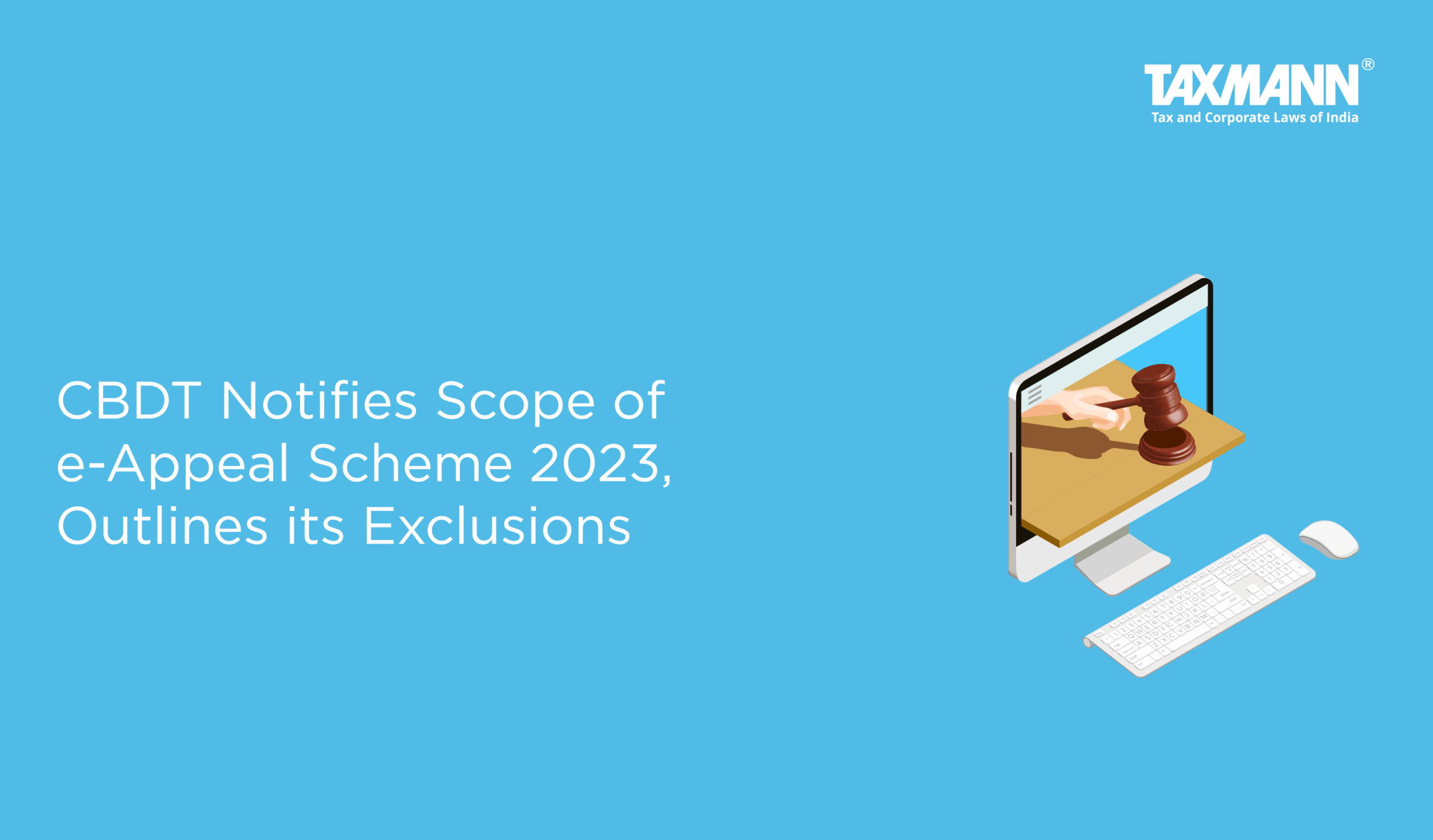CBDT Notifies Scope of e-Appeal Scheme 2023, Outlines its Exclusions
- Blog|News|Income Tax|
- 2 Min Read
- By Taxmann
- |
- Last Updated on 21 June, 2023

Order F. No. 370149/97/2023-TPL, dated 16-06-2023
Section 246 of the Income Tax Act, 1961 has been amended by the Finance Act, 2023, to include Joint Commissioner (Appeals). Recently, the Central Board of Direct Taxes (CBDT) issued various notifications for the implementation of appeals before the Joint Commissioner (Appeals). To further ease the manner of filing an application to the Joint Commissioner (Appeals), CBDT has notified the e-Appeal scheme 2023.
It specifies that all the appeals under section 246 or under clause (a), clause (b), clause (c), clause (ha), clause (hb), and clause (q) of 246A(1) shall be completed under the e-Appeals Scheme, 2023. The order outlines various exceptions to this, which are as follows:
a) Appeals against assessment orders passed before 13.08.2020 under section 143(3) or section 144 having disputed demand of more than Rs. 10 lakh.
b) Appeals related to:
1. Assessment orders passed with respect to cases pertaining to jurisdiction of Commissioner of Income-tax (Central).
2. Assessments completed in pursuance of search under section 132 or requisition under section 132A.
3. Assessments completed in pursuance of any action under section 133A.
4. Assessments where addition/variation in income is made based on seized/impounded material.
c) Appeals in cases pertaining to Commissioner of Income-tax (International Taxation) jurisdiction.
d) Appeals against the penalty orders passed before 12.01.2021 with respect to cases referred to in category (a), having disputed demand of more than Rs. 10 lakh.
e) Appeals against tile penalty orders passed in categories of cases mentioned in points 1 to 4 of (b) & of (c) above.
f) Appeals against assessment orders passed on or after 12.09.2019 under the e-Assessment Scheme, 2019, or the Faceless Assessment Scheme, 2019, or under section 144B.
g) Appeal against penalty orders passed on or after 12.01.2021 under the Faceless Penalty Scheme, 2021.
The order also defined the ‘disputed demand’, which means:
a) the difference between the tax on the total income assessed and the tax on the returned income, if filed;
b) tax on the total income assessed where no return has been filed;
c) for a penalty order, the amount of penalty imposed under Chapter XXI of the Act; and
d) Demand raised vide notice under section 156 or intimation issued under section 143(1) or under section 200A(1) or under section 206CB(1), in any other case.
It shall include applicable interest, surcharge and cess.
Disclaimer: The content/information published on the website is only for general information of the user and shall not be construed as legal advice. While the Taxmann has exercised reasonable efforts to ensure the veracity of information/content published, Taxmann shall be under no liability in any manner whatsoever for incorrect information, if any.

Taxmann Publications has a dedicated in-house Research & Editorial Team. This team consists of a team of Chartered Accountants, Company Secretaries, and Lawyers. This team works under the guidance and supervision of editor-in-chief Mr Rakesh Bhargava.
The Research and Editorial Team is responsible for developing reliable and accurate content for the readers. The team follows the six-sigma approach to achieve the benchmark of zero error in its publications and research platforms. The team ensures that the following publication guidelines are thoroughly followed while developing the content:
- The statutory material is obtained only from the authorized and reliable sources
- All the latest developments in the judicial and legislative fields are covered
- Prepare the analytical write-ups on current, controversial, and important issues to help the readers to understand the concept and its implications
- Every content published by Taxmann is complete, accurate and lucid
- All evidence-based statements are supported with proper reference to Section, Circular No., Notification No. or citations
- The golden rules of grammar, style and consistency are thoroughly followed
- Font and size that’s easy to read and remain consistent across all imprint and digital publications are applied



 CA | CS | CMA
CA | CS | CMA
